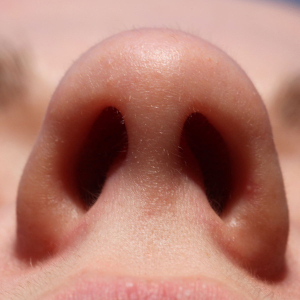We were just talking about the loss of the senses of taste and smell due to COVID19 recently. As if to answer some of our questions, a new study suggests anosmia may be caused by an auto-immune response…
 When you have anosmia, you small nothing. When
When you have anosmia, you small nothing. When
you have parosmia, everything smells ‘rotten’…
A Duke University research team has suggested that an ongoing anti-immune response is responsible for temporary – even permanent – damage to olfactory nerve cells and an associated decline in the number of those cells.
What they did
Researchers from Duke and the University of California – San Diego collected small samples of epithelial (nasal membrane) cells from 24 folks who had suffered anosmia in association with COVID19 and performed a physical examination (biopsy) on them. These particular patients had not recovered their senses of smell after recovering from COVID.
What they found
They discovered that, “This biopsy-based approach – using sophisticated single-cell analyses in collaboration with Dr. Sandeep Datta […] at Harvard University – revealed widespread infiltration of T-cells engaged in an inflammatory response in the olfactory epithelium, the tissue in the nose where smell nerve cells are located. This unique inflammation process persisted despite the absence of detectable SARS-CoV-2 levels.”
Additionally, the number of olfactory sensory neurons were diminished, possibly due to damage of the delicate tissue from the ongoing inflammation.
“The findings are striking,” report senior author Dr. Bradley Goldstein said. “It’s almost resembling a sort of autoimmune-like process in the nose.”
The takeaway
Goldstein said learning what sites are damaged and what cell types are involved is a key step toward beginning to design treatments. He said the researchers were encouraged that neurons appeared to maintain some ability to repair themselves even after the long-term immune onslaught.
“We are hopeful that modulating the abnormal immune response or repair processes within the nose of these patients could help to at least partially restore a sense of smell,” Goldstein said, noting such work is currently underway in his lab.
My take
It’s also good to hear that the work on anosmia might also help researchers determine the causes of other long COVID-19 symptoms – including generalized fatigue, shortness of breath, and brain fog – that might be triggered by similar biological mechanisms. I can confirm, from personal experience, that many of those other symptoms do show up – to some degree or another – when COVID strikes.
I’m among the lucky ones. My anosmia cleared itself up within a reasonable time after my main COVID symptoms disappeared. Many CCOVID sufferers are not so lucky. And still others also suffer a companion taste-smell affliction called parosmia, in which all smells register as ‘rotten’ in the sufferer’s brain.
And it’s nice to see a quick, decisive solution to a question like the anosmia mystery once top reserchers get on its tail!
~ Maggie J.

